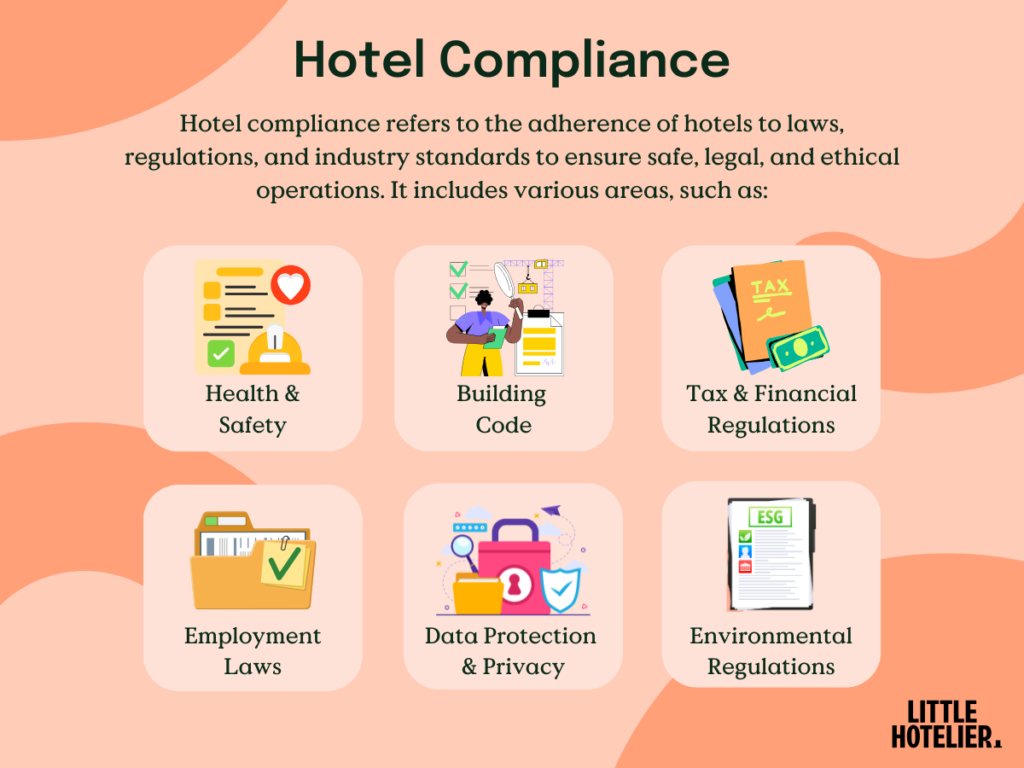What is hotel compliance?
Hotel compliance is a framework followed by hotels to ensure that they meet all legal, safety and operational standards required by relevant authorities and industry bodies. Compliance is a critical consideration for small, independent, hotels, as non-compliance can have serious consequences.
According to new FTC rules, for example, hotels found to have charged their guests hidden hotel fees face a fine of $46,517 per violation. The consequences of other forms of non-compliance can be even more severe, such as legal action for safety violations.
A hotel’s compliance obligations take a variety of different forms. Hotel pricing compliance aims to ensure fairness and transparency in all hotel charges. Hotel ADA compliance deals with US accessibility regulations. Hotel GDPR compliance targets data privacy and security.
In this guide we’ll take a closer look at hotel compliance: why it’s critical, what it looks like, and how to ensure your small, independent hotel ticks every single box.
Gain visibility and control over your hotel’s operations
Little Hotelier’s all-in-one platform offers crucial safety and security, helping small accommodation businesses remain compliant.
Learn moreWhy does hotel compliance matter?
Hotel compliance matters because it protects your guests, your staff and your hotel. It instils trust and confidence in your guests, and gives your small business much-needed stability. It also ensures you avoid the often significant consequences of non-compliance.
While some rules and standards might seem arbitrary, all of them are there for a reason. Safety standards deal with potential dangers before they become serious issues. Pricing compliance delivers important consumer protections. Data regulations keep everyone’s information safe from fraud and nefarious actors.
Compliance is your primary defence against fines, legal issues, shutdowns, and bad guest experiences that can result in serious reputational damage. It can be viewed as the stable base on which you can build a successful hotel business, and as such it should be the highest priority for any hotel owner.
Key takeaways:
- It protects your business, staff and guests.
- It helps you avoid fines, legal issues, shutdowns and bad guest experiences.
- It forms a stable foundation for a successful hotel business.

What are some common hotel compliance mistakes?
With quite a few rules and regulations to abide by, and with those rules changing from country to country, state to state, even city to city, it’s important that small, independent hoteliers take the time to understand their obligations.
Some semi-common hotel compliance mistakes that you should actively work to avoid include:
- Not disclosing full pricing: Failing to include taxes, fees or surcharges in advertised rates.
- Overlooking accessibility regulations: Missing required features or not listing accessibility info clearly.
- Improper handling of guest data: Collecting unnecessary data and/or storing it insecurely.
- Outdated cancellation policies: Failing to update policies to align with changing local consumer protection laws.
- Missing permits or licences: Operating without required health, safety or business certifications.
- Non-compliant affiliate partnerships: Failing to follow contractual rules around commission disclosure, rate parity and marketing claims.
- Lack of staff training: Not making your team aware of compliance obligations and procedures.
Important hotel compliance to follow for small hotels
Here are four of the most common types of hotel compliance:
- Hotel price compliance: All elements of the total booking price are listed clearly and accurately.
- Accessibility compliance: All guests have access to the property according to local rules.
- Data privacy compliance: Only necessary data is collected, and all information is kept safe.
- Hotel affiliate compliance: The contractual rules of an affiliate partnership are followed.
Hotel compliance spans a variety of areas, and the obligations that apply to your property will often depend on the amenities you offer: e.g. food safety regulations for on-site kitchens, responsible service of alcohol in bars, rules around pool safety.
That said, many rules and regulations will apply to almost all properties (though the specifics of these rules may change from region to region). Some of the more common compliance considerations for a small, independent hotel will include:
1. Hotel pricing compliance
Pricing rules are designed to ensure that your advertised room rates match what guests are actually charged. Compliance generally requires total transparency around fees, taxes and surcharges. This isn’t just about being fair; it’s also about gaining and retaining guest trust.
2. Hotel ADA compliance
If your property operates in a region with accessibility regulations (such as the ADA in the US), you’re required to provide accessible facilities and services for guests with disabilities, such as wheelchair access, visual aids, and accessibility information on your website.
3. Hotel GDPR compliance
The EU’s GDPR legislation and California’s CCPA are world-leading data privacy rules designed to ensure businesses handle personal data responsibly. As a hotel will often welcome international and interstate visitors, many guests will expect your hotel to comply with these laws, even if you don’t reside in the relevant jurisdictions.
4. Hotel affiliate compliance
If your hotel partners with OTAs, GDSs or travel agents, you’ll agree to a range of affiliate rules. Compliance means meeting rate parity, commission disclosure and marketing expectations, e.g. offering the same rate for direct bookings as for OTA listings.
Key takeaways:
- Begin with safety and other business-critical rules and regulations.
- Ensure accessibility and data privacy compliance.
- Set your pricing in line with affiliate rules and clearly outline all charges.
Tools to help you conduct hotel compliance training
Small, independent, hotels can streamline compliance training by using purpose-built digital tools that make it easy to educate and update staff on essential regulations.
Online learning platforms like TalentLMS and Trainual allow hoteliers to create custom hotel compliance training modules covering topics like data protection, accessibility, health and safety or pricing transparency. These platforms often include features like progress tracking, quizzes and certifications to help you check that your staff understand their responsibilities.
Even simple tools like shared Google Docs, checklists or recorded video briefings can be effective, as long as the content is clear and up-to-date.
Then there are tools that take care of much of the compliance for you, relieving you and your staff of the onerous work of ticking regulatory boxes. Little Hotelier, for example, features clever automations that can ensure all relevant rules are followed and actions are documented, to keep you, your business and your guests safe.
Key takeaways:
- Online learning platforms like TalentLMS and Trainual can help with training.
- Simple documents, checklists and videos could be enough for smaller hotels.
- Automated tools like Little Hotelier help you meet your compliance requirements.
By Dean Elphick
Dean is the Senior Content Marketing Specialist of Little Hotelier, the all-in-one software solution purpose-built to make the lives of small accommodation providers easier. Dean has made writing and creating content his passion for the entirety of his professional life, which includes more than six years at Little Hotelier. Through content, Dean aims to provide education, inspiration, assistance, and, ultimately, value for small accommodation businesses looking to improve the way they run their operations (and live their life).
Table of contents
“Our accommodations are perfectly taken cared of, thanks to Little Hotelier. It's now easier to get real-time info! Payments are easily traced too.”
General Manager, Marina View Chalets









Sean O’Neill,
Owner
Devereux Residences